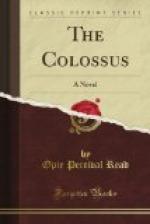“I think you shall, as I intend to make this my resting-place.”
“There is another character,” said McGlenn, referring to Mortimer. “He is a very learned man, so much so that he has no need of imagination. He is a very learned man.”
“And he is charmed with the prospect of saying a mean thing,” Richmond replied. “I tell him so,” he added, “though that is needless, for he knows it himself. His mind has traveled over a large scope of intellectual territory, and he commands my respect while I object to his methods.”
The conversation took a serious turn, and Richmond flooded it with his learning. His voice was low and his manner modest—a great man who in the game of human affairs played below the limit of his abilities. McGlenn roused himself. When emphatic, he had a way of turning out his thumb and slowly hammering his knee with his fist. In his sky there was a cloud of pessimism, but the brightness of his speech threw a rainbow across it. He was a poet in the garb of a Diogenes. Many of his theories were wrong, but all were striking. Sometimes his sentences flashed like a scythe swinging in the sunshine.
Henry talked as he had never found occasion to talk before. These men inspired him, and in acknowledgment of this he said: “We may for years carry in our minds a sort of mist that we cannot shape into an idea. Suddenly we meet a man, and he speaks the word of life unto that mist, and instantly it becomes a thought.”
Other members joined the group, and the conversation broke and flew into sharp fragments. McGlenn and Richmond began to wrangle.
“Your children may not read my books,” said McGlenn, replying to some assertion that Richmond had made, “but your great-grandchildren will.”
“Oh, that’s possible,” Richmond rejoined. “I can defend my immediate offspring, while my descendants may be left without protection. If you would tear the didacticism out of your books and inject a little more of the juice of human interest—hold on!” Richmond threw up his arm, as though warding off a blow. “When that double line comes between his eyes I always feel that he is going to hit me.”
“I wouldn’t hit you. I have some pity left.”
“Or fear—which is it?”
“Not fear; pity.”
“Why don’t you reserve some of it for your readers?”
McGlenn frowned. “I don’t expect you to like my books.”
“Oh, you have realized the fact that the characters are wooden?”
“No, but I have realized that they are beyond your feeble grasp. I don’t want you to like my books.” He hammered his knee. “The book that wins your regard is an exceedingly bad production. When you search for facts you may sometimes go to high sources, but when you read fiction you go to the dogs. A consistent character in fiction is beyond you.”
“There are no consistent characters in life,” said Richmond, “and a consistent character in fiction is merely a strained form of art. In life the most arrant coward will sometimes fight; the bravest man at times lacks nerve; the generous man may sometimes show the spirit of the niggard. But your character in fiction is different. He must be always brave, or always generous, or always niggardly. He must be consistent, and consistency is not life.”




